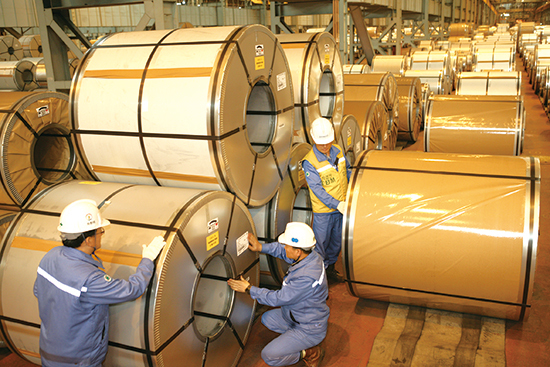Bogged by risks from weakening profits and China’s economic slowdown, South Korean steelmakers are seeing higher-than-estimated annual sales in a niche sector to become a major growth engine ― premium auto steel sheets.
POSCO and Hyundai Steel, the top two Korean steelmakers, are revving up to gain a competitive edge in auto steel sheets, focusing on developing super high-strength, lightweight products.
POSCO and Hyundai Steel, the top two Korean steelmakers, are revving up to gain a competitive edge in auto steel sheets, focusing on developing super high-strength, lightweight products.

To realize this goal, POSCO recently broke ground for new facilities to produce advanced high-strength steel in Gwangyang, South Jeolla Province, and plans to build another plant in Chongqing, China, with an annual production capacity of 900,000 tons later this year.
Hyundai Steel, for its part, is further banking on developing extra-strong, light automotive sheets.
Because more than 90 percent of its products are used by its mother company, Hyundai Motor Company, upgrading their product performance is the core task, according to industry watchers.
One theory for the rush has much to do with China ― its rapid growth with already more than 50 percent of the global market share, soaring risk from China’s weakening economic data and the slumping shipbuilding industry.
“Chinese rivals are catching up very fast. What we can do, instead of joining their price competition, is to develop special (lightweight, extra strong) steel products that require decades of research and experience,” Kim Sung-joo, director at Hyundai Steel’s research and development center, said in a recent interview with The Korea Herald.
The question remains, however, whether the Korean firms will keep their competitive edge both in price and technology to fend off competition from Chinese products that have much lower price tags.
Prices of China-imported hot-rolled steel sheets have seen an additional cut this month with China’s surprise yuan depreciation on Aug. 11.
Industry reports said the price dropped to $549 per ton, down about 2 percent from the average price of $560 in the January-August period. Chinese products were already notorious for marking their prices as much as 25 percent lower than global competitors.
Hot-rolled steel sheets are major product lines of POSCO and Hyundai Steel, accounting for about 16 percent and 64 percent of their total sheet product sales, respectively, according to reports.
With prices so attractive, Korea imported 318,000 tons of Chinese hot-rolled steel sheets in August, up 12 percent from 280,000 tons on-year.
More notably, the market price of Chinese steelmakers and local importers have continuously dropped, according to market insiders. The market price was about $300 per ton, down more than $60 in just two months.
Market analysts voiced concerns about further price cuts in auto steel sheets before the year end.
“There is a high chance that the prices will drop, meaning low profitability for us, as prices of raw materials have all dropped recently,” a source said.
By Suk Gee-hyun (monicasuk@heraldcorp.com)



![[Exclusive] Korean military set to ban iPhones over 'security' concerns](http://res.heraldm.com/phpwas/restmb_idxmake.php?idx=644&simg=/content/image/2024/04/23/20240423050599_0.jpg&u=20240423183955)




![[Pressure points] Leggings in public: Fashion statement or social faux pas?](http://res.heraldm.com/phpwas/restmb_idxmake.php?idx=644&simg=/content/image/2024/04/23/20240423050669_0.jpg&u=)










